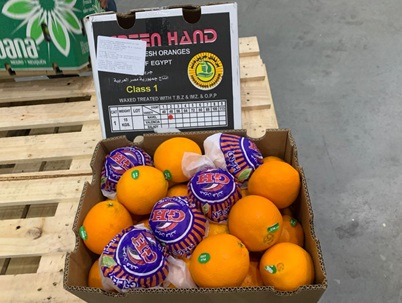Brazil gets its first shipments of Egyptian oranges
Egypt’s new citrus season has just begun and its first shipments of locally produced oranges have been exported to Brazil, Egyptian trade minister announced on Monday.
The shipments of the new season of Egyptian oranges has been sent to the Brazilian market in cooperation with the Brazilian Embassy in Cairo.
Minister Nevine Gamea said the shipments represent the first of the new season going to a South American country as part of the free trade agreement signed between Egypt and Mercosur countries. Other countries that are part of the Mercosur area involve Argentina, Paraguay, and Uruguay.

The Mercosur agreement plays significant importance in opening new markets to Egyptian products, Gamea added.
Ibrahim Al-Sigini, Egyptian Assistant Minister of Trade and Industry for economic affairs, said that a Brazilian technical mission had visited Cairo back in 2020 to agree on the import of Egyptian citrus fruits to its markets.
During its visit to Egypt, the mission inspected a number of Egyptian citrus farms, accompanied by plant health specialists at the Egyptian Plant Quarantine Authority.
The visit came in preparation for the opening of the Brazilian market to Egyptian citrus exports.
The Egyptian Ministry of Trade and Industry’s Foreign Trade and Agreements Sector held a series of meetings with local businessmen and exporters. These meetings held in cooperation with the Brazilian Embassy in Cairo and the Arab-Brazilian Chamber of Commerce in São Paulo.
The meetings aimed to introduce privileges and customs exemptions offered by the free trade agreement between Egypt and the Mercosur countries, Sigini added.
There have been several rounds of technical consultations between Egypt’s Ministry of Agriculture and its Brazilian counterpart. These consultations had finally resulted in the registration of Egyptian garlic and oranges in Brazil in May 2020.
The Brazilian market, the largest South American market with about 209 million consumers, entails huge opportunities for the Egyptian citrus industry, Al-Sigini said.


